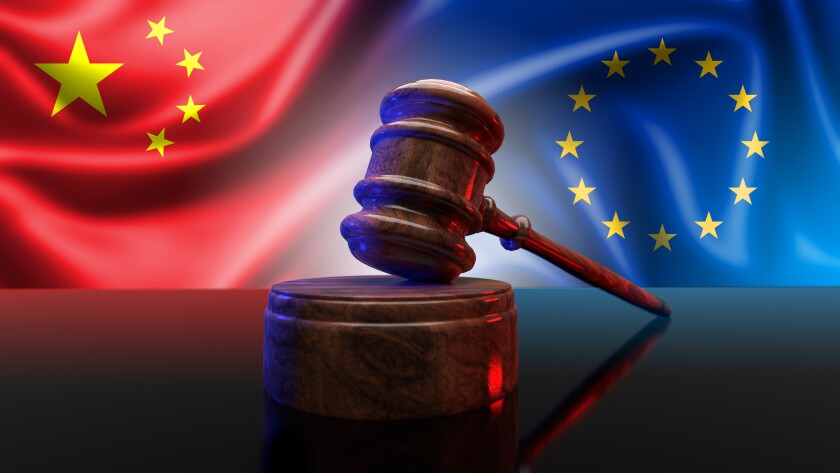Anti-suit injunctions (ASIs) issued by Chinese courts, which prevent parties of proceedings concerning standard-essential patents (SEPs) from bringing actions against each other in different countries, have become one of the controversial topics in these proceedings, highlighting the ‘jurisdiction of the court’.
In the case of SEPs, the first issue that confronts the patent holder and the company implementing the SEP is whether a licence has been asked for, offered, and/or granted on fair, reasonable, and non-discriminatory (FRAND) terms, and how the licence fee should be determined.
The court tasked with resolving such a dispute is often dealing with multinational companies with worldwide operations and a worldwide interest in the determination of FRAND terms and the licence fee, not only in the country where the relevant court is located, but also worldwide.
Therefore, the court may determine licence fees on FRAND terms limited to the country in which it is located and the patents enforceable there, or it may determine licence fees on FRAND terms applicable worldwide between the parties. In such cases, the common view of the courts in Europe and the US is that since FRAND disputes are essentially contractual disputes, a global rate for the entire patent portfolio licensed under the contract in question can be determined by a single court.
Regional FRAND practice and anti-suit injunctions
In 2017, in the Unwired Planet v Huawei case, the UK Supreme Court held that it had jurisdiction to determine the terms of a global FRAND licence agreement between the parties, covering not only the SEP holder's UK patents but also foreign patents valid in other countries covered by FRAND commitments. Similar judgments continue to be issued by US courts.
The fact that the court of a certain country determines the licence terms that apply globally for the parties has led to the operation of different legal mechanisms. Indeed, while a dispute regarding a licence under FRAND terms is pending before a court in one country, the patent holder company may file an infringement action in another country claiming infringement of the same patents, and while the parties have not yet resolved the litigation over a licence fee on FRAND terms, a preliminary injunction grounding on patent infringement may be granted by a court in another country.
The legal mechanism that has started to be used in such situations is the ASI, which prevents the patent owner from filing a lawsuit in foreign countries or enforcing the preliminary injunctions granted by foreign courts in favour of the patent holder.
The first notable ASI decision in a case concerning the determination of a licence fee on FRAND terms was rendered by the US District Court for the State of Washington in Microsoft v Motorola. In the case, Microsoft alleged that Motorola breached its commitment to offer Microsoft a licence on FRAND terms.
While this case was pending, Motorola filed a patent infringement lawsuit against Microsoft in Germany. The German court upheld the patent infringement claim and enjoined Microsoft from selling the infringing products in Germany. In response to the German court's judgment, Microsoft applied to the US court just before the judgment was enforced and sought an ASI decision to prevent Motorola from enforcing the judgment in Germany. The US court ruled a decision to prevent Motorola from filing a lawsuit that would prevent it from enforcing the judicial decision it obtained against Microsoft in Germany for patent infringement.
The issue to be considered here is that ASI judgments are ‘in personam’. In other words, they bind the parties, not the courts. In the above example, the US court issued an injunction that binds Motorola and has the power to impose sanctions on it within the authorisation and jurisdiction of the US in the event of non-compliance.
Although ASI judgments are a type of injunction that is unfamiliar to Continental European legal systems such as Turkey, ASI judgments are frequently encountered in Anglo-Saxon law. The basis of this difference lies in whether the courts consider themselves competent outside their country. For example, Turkish courts do not recognise ASI judgments issued by foreign courts within the framework of the right to a fair trial and the freedom to seek justice protected by the Constitution, or do not consider that they have jurisdiction to issue ASI judgments that would prevent the filing of a lawsuit before foreign countries.
This legal mechanism, which was frequently used by European and US courts until recently, was also applied by Chinese courts in 2020 and caused great controversy.
EU raises concerns over Chinese preliminary injunctions
As a result of the patent infringement lawsuit brought by Conversant against Huawei and ZTE before the German courts, the German court found that Huawei and ZTE had infringed Conversant's SEPs and issued preliminary injunctions to remove the infringing products from the German market. In the meantime, however, Huawei and ZTE applied to the Supreme People's Court of China to prevent Conversant from enforcing injunctions obtained in Germany and succeeded in obtaining an ASI decision preventing Conversant from filing a lawsuit against Huawei and ZTE regarding its SEPs and from enforcing the injunctions issued by the German court.
Following this preliminary injunction decision issued by the Supreme People's Court of China, Chinese courts continued to issue preliminary injunctions ‘to prevent litigation’ (ASIs) within the scope of the Xiaomi v InterDigital, Oppo v Sharp, and Samsung v Ericsson files, preventing standard essential patent holders from filing lawsuits in foreign countries or enforcing preliminary injunction decisions issued by foreign courts.
Following these developments, on July 6 2021, the EU sent an official request for information to China, requesting information about the injunctions granted by Chinese courts in the Xiaomi v InterDigital, ZTE v Conversant, OPPO v Sharp, and Samsung v Ericsson cases, and the legal basis for blocking the implementation of judicial decisions made in Europe, pursuant to Article 63.3 of the Agreement on Trade-Related Aspects of Intellectual Property Rights (the TRIPS Agreement). Article 63.3 regulates the obligation of member states to provide information in response to the written request of another member country that believes that a judicial decision or an administrative decision in the field of intellectual and industrial property rights or a bilateral agreement affects its rights under the TRIPS Agreement.
On September 7 2021, the Chinese government stated that it was not obliged to respond to the EU’s request for information under the TRIPS Agreement.
EU claims unfair patent right restrictions and fair trade impediments
The EU filed a request for consultation with the World Trade Organization (WTO) on February 18 2022, claiming that the practices of Chinese courts unfairly restrict patent rights and impede fair trade, in violation of the provisions of the TRIPS Agreement. On March 4 2022, Canada, Japan, and the US also requested to join the EU’s request for consultation.
The EU asserted the following in its application:
With the preliminary injunctions that prevent SEP holders from filing lawsuits in foreign countries or enforcing preliminary injunctions issued by foreign courts (ASIs) and with the regulations that impose administrative fines (CNY 1 million per day) against patent-holding companies in the event of non-compliance with these decisions, China violated TRIPS Agreement articles 1.1, 28.1, 28.2, 41.1, and 44.1. The articles protect the patent holder's right to prevent third parties from producing, using, offering for sale, selling, or importing that product for these purposes without obtaining the consent of the patent owner in cases where patent infringement exists and protect their right to obtain a judicial decision by applying to the competent courts in this regard.
China violated the regulation set forth in the Protocol on Accession to TRIPS Section 2(A)(2), which provides that China shall apply and manage in a uniform, impartial, and reasonable manner all laws and regulations relating to trade in goods and services, trade-related aspects of intellectual property rights, or foreign exchange control.
China had acted contrary to its obligations regarding the publication of decisions on intellectual and industrial property rights in Article 63.1 of the TRIPS Agreement by not publishing some of the judicial decisions regarding the preliminary injunctions in question.
By failing to respond to the request for information sent by the EU to China on July 6 2021 regarding three cases concerning the preliminary injunction decisions in question, it breached the obligation of member states within the scope of Article 63.3 of the TRIPS Agreement to provide information in response to the written request of another member state that believes that a particular judicial or administrative decision or bilateral agreement in the field of intellectual and industrial property rights affects their rights under the TRIPS Agreement.
Arbitral tribunal formed after agreement between the EU and China
On December 7 2022, the EU submitted a petition to the WTO, requesting that a delegation be formed at the meeting of the Dispute Settlement Body to be held on December 20 2022, and that the allegations of TRIPS Agreement violations against China be evaluated by this delegation. With the agreement between China and the EU on March 28 2023, an arbitral tribunal was formed, and it was decided that this arbitral tribunal would examine the current dispute in accordance with Article 25 of the WTO’s handbook on dispute resolution, which relates to the rules of dispute resolution through arbitration.
When the petition submitted by the EU to the WTO on February 22 2022 is examined, it can be seen that the following facts are expressed as the fundamental problems of the conflict:
The duration of ASI decisions issued by Chinese courts is subject to daily fines;
The ban decision is valid worldwide;
The Supreme Court of China has stated that it has the authority to determine a global licence fee for a SEP subject to the lawsuit and that the ASI decisions were necessary to prevent licence fees that would be too high for the Chinese state; and
Chinese courts have been making such decisions systematically lately.
Final thoughts on the EU’s claims and the WTO’s response
The EU may be criticised for complaining about the practice of Chinese courts, considering that ASI decisions are frequently made in countries that have adopted the Anglo-Saxon legal system and in many European countries. However, the ASI decisions made by European and US courts are limited with a term that is necessary for the relevant European or US court to resolve the case and these decisions have a nature that prevents a parallel case in a certain country, in order not to make the solution of the FRAND case before a European or US court meaningless, and, most importantly, an extremely high amount of daily fines are not imposed as a sanction for non-compliance with the final decision.
Considering that the evaluation to be made by the WTO will serve as a guide for all TRIPS Agreement countries on how ASI decisions should be approached, especially within the framework of TRIPS Agreement principles, the decision of the delegation will be closely followed.













